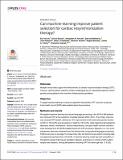Can machine learning improve patient selection for cardiac resynchronization therapy?
Author(s)
Santus, Enrico; Forsyth, Alexander W.; Haimson, Josh; Barzilay, Regina
DownloadPublished version (961.2Kb)
Publisher with Creative Commons License
Publisher with Creative Commons License
Creative Commons Attribution
Terms of use
Metadata
Show full item recordAbstract
Rationale Multiple clinical trials support the effectiveness of cardiac resynchronization therapy (CRT); however, optimal patient selection remains challenging due to substantial treatment heterogeneity among patients who meet the clinical practice guidelines. Objective To apply machine learning to create an algorithm that predicts CRT outcome using electronic health record (EHR) data avaible before the procedure. Methods and results We applied machine learning and natural language processing to the EHR of 990 patients who received CRT at two academic hospitals between 2004–2015. The primary outcome was reduced CRT benefit, defined as <0% improvement in left ventricular ejection fraction (LVEF) 6–18 months post-procedure or death by 18 months. Data regarding demographics, laboratory values, medications, clinical characteristics, and past health services utilization were extracted from the EHR available before the CRT procedure. Bigrams (i.e., two-word sequences) were also extracted from the clinical notes using natural language processing. Patients accrued on average 75 clinical notes (SD, 29) before the procedure including data not captured anywhere else in the EHR. A machine learning model was built using 80% of the patient sample (training and validation dataset), and tested on a held-out 20% patient sample (test dataset). Among 990 patients receiving CRT the mean age was 71.6 (SD, 11.8), 78.1% were male, 87.2% non-Hispanic white, and the mean baseline LVEF was 24.8% (SD, 7.69). Out of 990 patients, 403 (40.7%) were identified as having a reduced benefit from the CRT device (<0% LVEF improvement in 25.2%, death by 18 months in 15.6%). The final model identified 26% of these patients at a positive predictive value of 79% (model performance: Fβ (β = 0.1): 77%; recall 0.26; precision 0.79; accuracy 0.65). Conclusions A machine learning model that leveraged readily available EHR data and clinical notes identified a subset of CRT patients who may not benefit from CRT before the procedure.
Date issued
2019-10-03Department
Massachusetts Institute of Technology. Department of Electrical Engineering and Computer ScienceJournal
PLoS one
Publisher
Public Library of Science (PLoS)
Citation
Hu, Szu-Yeu et al. "Can machine learning improve patient selection for cardiac resynchronization therapy?" PLoS one 14 (2019): e0222397 © 2019 The Author(s)
Version: Final published version
ISSN
1932-6203
Keywords
General Biochemistry, Genetics and Molecular Biology, General Agricultural and Biological Sciences, General Medicine